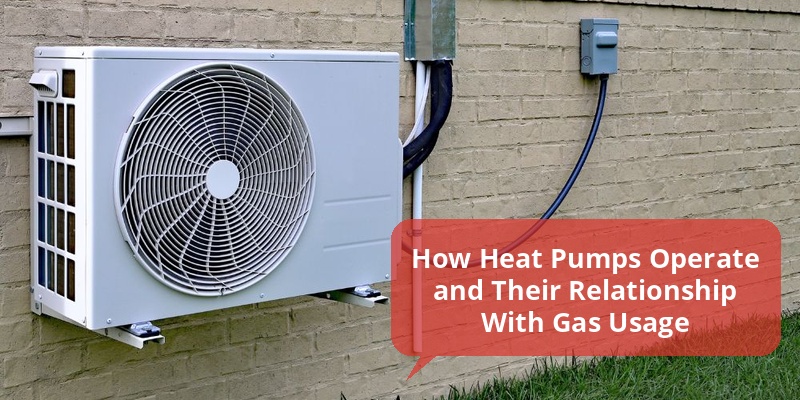Heat pumps are increasingly popular for their energy efficiency in heating and cooling homes. A common question arises about their fuel sources, particularly regarding gas usage. Heat pumps primarily use electricity to transfer heat and do not rely on natural gas or other gaseous fuels. However, some hybrid or dual-fuel systems may incorporate gas to complement their operation under certain conditions.
| Feature | Heat Pump | Gas Furnace |
|---|---|---|
| Primary Energy Source | Electricity | Natural gas or propane |
| Heating Method | Heat transfer using refrigerants | Combustion of gas fuel |
| Cooling Capability | Yes, reverse cycle for cooling | No |
| Common Use | Heating and cooling in moderate climates | Heating only |
How Heat Pumps Function Without Gas
Heat pumps work by moving heat rather than generating it through combustion. They use electricity to power a compressor and a refrigerant cycle that absorbs heat from the outside air or ground and transfers it indoors during winter. In warmer months, the process reverses to cool indoor spaces.
This heat transfer process allows heat pumps to achieve high efficiency without burning fossil fuels like natural gas. Therefore, a standard heat pump does not consume gas for heating or cooling.
Understanding Dual-Fuel or Hybrid Heat Pump Systems
Some homeowners use hybrid systems combining a heat pump with a gas furnace. These systems switch between electricity and gas depending on outdoor temperatures and energy cost efficiency. For example, the heat pump operates primarily in mild weather while the gas furnace activates in very cold temperatures to provide supplemental heat.
Hybrid systems effectively use gas only when necessary, reducing overall fuel consumption and maintaining comfort. This configuration benefits regions with extreme winter conditions where heat pumps alone might struggle.
Advantages of Using Electric Heat Pumps Over Gas Heating
- Energy Efficiency: Heat pumps can deliver 3 to 4 times more heat energy than the electrical energy they consume, unlike gas furnaces limited by combustion efficiency.
- Environmental Impact: Electric heat pumps produce no direct greenhouse gas emissions, especially when powered by renewable energy sources.
- Cooling Functionality: Heat pumps offer year-round climate control by switching to air conditioning mode during warm seasons.
- Safety and Maintenance: Heat pumps avoid risks associated with gas combustion such as carbon monoxide leaks and require less maintenance.
When Does a Heat Pump Use Gas?
A heat pump by itself does not use gas. However, in systems designed with a backup or supplemental gas furnace, gas usage occurs under specific scenarios:
- During extreme cold weather when the heat pump cannot efficiently extract heat from outside air.
- When electricity rates spike, making gas heating temporarily more economical.
- As backup heat during heat pump maintenance or failure.
Such dual-fuel setups optimize comfort and energy costs by intelligently switching between fuels.
Gas Heat Pumps and Emerging Technologies
There are specialized gas-powered heat pumps available, such as absorption heat pumps that use natural gas or propane fuel. These are less common in residential use and often reserved for commercial or industrial applications.
These gas heat pumps operate differently from electric ones by powering the refrigerant cycle with combustion energy instead of electricity. Despite this, most consumer heat pumps in the U.S. market are electric-based.
Choosing Between a Heat Pump and Gas Heating System
| Criteria | Electric Heat Pump | Gas Heating System |
|---|---|---|
| Energy Source | Electricity | Natural gas, propane |
| Operational Cost | Lower in mild climates or with renewables | Varies based on gas prices |
| Environmental Impact | Lower emissions if electricity is clean | Emits CO2 from combustion |
| Climate Suitability | Best in moderate climates | Effective in very cold climates |
| Heating and Cooling | Both heating and cooling | Heating only |
Ultimately, the decision to use a heat pump alone or combined with a gas system depends on geographic location, climate, energy prices, and personal preferences.
Impact of Gas Prices on Heat Pump Use
Fluctuations in natural gas prices can influence decisions regarding hybrid systems. Rising gas costs make electric heat pumps more attractive, especially those powered by renewable electricity, by lowering overall heating expenses.
Efficient heat pumps reduce reliance on gas consumption either by fully replacing gas furnaces or minimizing their runtime.
Conclusion on Heat Pumps and Gas Usage
The key takeaway is that standard heat pumps operate using electricity and do not use gas as a fuel source. Yet, hybrid or dual-fuel systems may incorporate natural gas as supplementary heating during cold spells. Understanding this distinction helps homeowners choose efficient, cost-effective heating and cooling solutions tailored to local energy options and climate demands.
